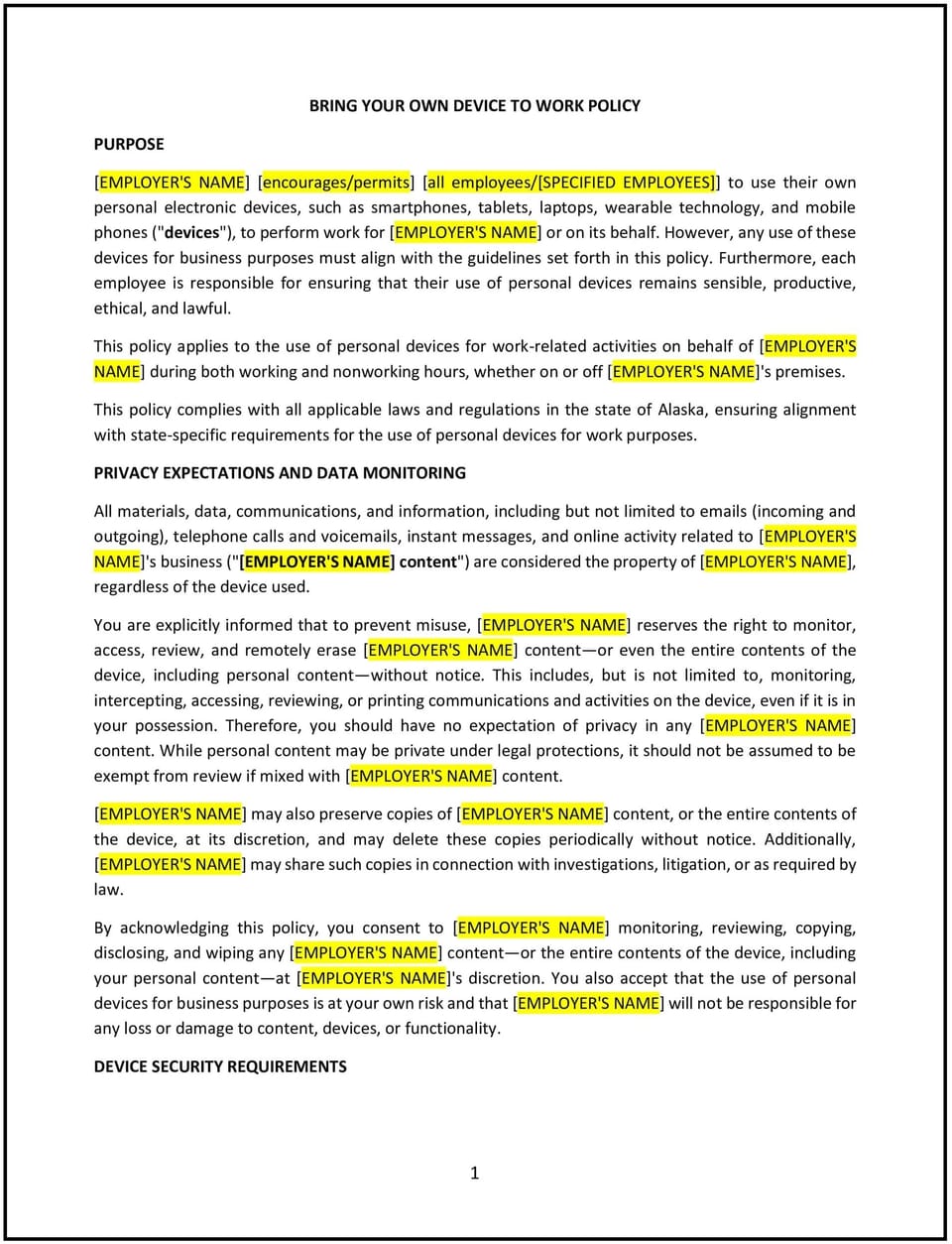Bring your own device to work policy (Alaska): Free template

Bring your own device to work policy (Alaska)
In Alaska, a bring your own device (BYOD) policy outlines guidelines for employees using personal devices, such as smartphones, tablets, and laptops, for work-related purposes. This policy helps businesses manage security risks, maintain operational efficiency, and protect sensitive information while accommodating employee preferences. By implementing a clear BYOD policy, businesses can balance convenience with security and compliance needs.
Alaska's unique workforce conditions, such as remote work and industries with seasonal or outdoor operations, may require tailoring the policy to include provisions for secure remote access, device usage during extreme conditions, or connectivity challenges.
How to use this bring your own device to work policy (Alaska)
- Define device usage: Specify what types of personal devices are covered under the policy, including smartphones, laptops, and tablets, and clarify their acceptable uses for work-related activities.
- Address security requirements: Outline security measures employees must follow, such as installing antivirus software, using strong passwords, and enabling device encryption. Include guidelines for securing devices used in remote or outdoor locations.
- Specify employer rights: Clearly state the company’s rights to monitor or access work-related data on personal devices and the limitations of this access, ensuring transparency.
- Provide IT support guidelines: Detail what level of technical support the company will offer for personal devices and any associated restrictions, such as only supporting approved apps or configurations.
- Clarify reimbursement policies: Include provisions for reimbursing employees for work-related usage costs, such as data plans or specific app purchases, if applicable.
Benefits of using a bring your own device to work policy (Alaska)
A BYOD policy provides several benefits for businesses in Alaska. Here’s how it helps:
- Supports security: Reduces risks of data breaches by establishing clear security requirements for personal devices used for work purposes.
- Enhances flexibility: Allows employees to use devices they are comfortable with, increasing satisfaction and efficiency.
- Promotes cost savings: Reduces hardware expenses by enabling employees to use their own devices instead of company-issued equipment.
- Improves accessibility: Supports remote work and field operations, which are common in Alaska, by enabling employees to stay connected on their personal devices.
- Encourages consistency: Ensures all employees follow the same guidelines, reducing confusion and minimizing risks.
Tips for using a bring your own device to work policy (Alaska)
- Include remote access guidelines: Provide clear instructions for securely accessing company systems and data from personal devices, particularly for remote or hybrid employees.
- Regularly update security measures: Ensure that the policy reflects current best practices in device security, such as two-factor authentication and VPN usage.
- Address device loss or theft: Include procedures for reporting and mitigating risks if an employee’s personal device is lost or stolen.
- Communicate limits on personal use: Clarify that work-related activities take priority and ensure employees understand the limitations on personal use during work hours.
- Offer training: Educate employees on best practices for device security and how to follow the policy effectively.
Q: What types of devices are covered under this policy?
A: The policy typically covers smartphones, tablets, laptops, and any other personal devices used for work-related activities.
Q: How does this policy protect company data on personal devices?
A: The policy outlines security measures such as encryption, strong passwords, and guidelines for securely accessing company systems to reduce data risks.
Q: Are employees reimbursed for work-related use of their devices?
A: Reimbursement policies vary by employer and should be outlined in the policy. Employers may choose to reimburse data plans or specific app purchases if needed.
Q: What happens if a personal device is lost or stolen?
A: Employees should immediately report the incident to the company, and the policy should include procedures for securing company data on lost or stolen devices.
Q: Can employees use personal devices for non-work activities during work hours?
A: The policy may allow limited personal use, but work-related activities should take priority. Employers can specify acceptable limits within the policy.
This article contains general legal information and does not contain legal advice. Cobrief is not a law firm or a substitute for an attorney or law firm. The law is complex and changes often. For legal advice, please ask a lawyer.


